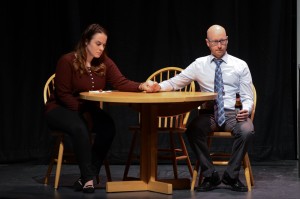 Anyone who has lost a child or a sibling to premature death finds the experience inexplicable and unique, and even parents who lose the same child together will cope differently from each other, sometimes driving a wedge of mutual incomprehension between them. No one can truly understand the grief of another person, no matter how interlinked their circumstances may be, and they must accept the impossibility prerequisite to a modus vivendi.
Anyone who has lost a child or a sibling to premature death finds the experience inexplicable and unique, and even parents who lose the same child together will cope differently from each other, sometimes driving a wedge of mutual incomprehension between them. No one can truly understand the grief of another person, no matter how interlinked their circumstances may be, and they must accept the impossibility prerequisite to a modus vivendi.
Rabbit Hole by playwright David Lindsay-Abaire deals with subject matter that has the potential to be extremely depressing if not outright maudlin, but it displays a surprising amount of humor in the everyday interactions of a family dealing with the accidental death of a 4-year-old child some months earlier. It won the 2007 Pulitzer Prize for Drama under unusual circumstances when the board deadlocked in a split among the jury’s three nominees, eventually bestowing the award on this play, which was not among those nominees. Lindsay-Abaire has been prolific since his first play, Fuddy Meers, which also deals with pathologically broken people, although in a far more absurdist way.
Becca (Tammy Mulrooney) and Howie (Dan Fisher) are a married couple living in Larchmont, New York, a very upscale suburban bedroom community in Westchester County from which Howie commutes into Manhattan on the train. Their 4-year-old son, Danny, was killed in an accident, eight months before the play opens, when he ran out into the street chasing the family dog. Everyone and no one is to blame: Howie regrets buying the dog and leaving the gate unlatched, while Becca regrets not checking the gate latch and going inside to take a telephone call from her sister, Izzy (Hollie DiOrio), who regrets making the telephone call to complain about their mother Nat (Becky Minard). Danny’s death was an accident in the purest sense of the term, a result of a dozen things all going wrong, any one of which had they gone differently quite possibly would have changed the result.
Tensions rise as Becca and Howie develop coping strategies almost diametrically opposed. She removes pictures of Danny from the walls, prepares to give Danny’s clothes and toys to charity, “temporarily” places the dog with her mother, and becomes almost obsessed with avoiding the many constant reminders of Danny, even insisting that they sell the house and move. Howie, on the other hand, ritualistically rewatches a videotape of Danny playing with the dog, the last videotape made before Danny’s death.
We learn in the opening scene that Izzy, Becca’s younger sister who has led a life of carefree partying of which Becca emphatically disapproves, has become pregnant. Becca’s jealousy is obvious despite her efforts to hide it.
Just before the end of the first act, Becca and Howie receive a letter from Jason (Raymond Fournier), the 17-year-old boy who was driving the car that killed Danny. He has written a science-fiction story that he is going to publish in his high school literary magazine, and he asks permission to dedicate it to Danny. The story is about “rabbit holes” between infinite dissimilar universes, each one of which is slightly different from every other.
By any objective measure, Becca is the central character: Hers is the most unhealthy reaction to Danny’s death, and the other characters spend a great deal of their time tiptoeing on eggshells to placate her. She avoids therapy, but tries to be the perfect homemaker. It is her being too tightly wound that drives the play. Mulrooney portrays her just a bit too level, in my opinion, for a character who is cracking under pressure largely of her own making, oscillating between phases of mania and depression. Fisher nails the explosive Howie. Minard is very credible as the highly non-maternal Nat. Fournier does a superb job with his brief role as Jason. DiOrio perfectly handles the most difficult scene in the play, where she must silently react in a moment of ecstatic sisterly bonding as Nat explains how Becca pretty much lost it at the supermarket, acting just as Izzy would have.
The Community Players put on a very solid performance of challenging and potentially disturbing, but thoughtful material. Someone who has lost a child or a sibling to premature death could be either upset or comforted by this play, depending upon their particular outlook and approach – which is substantially the point.
Rabbit Hole, directed by Eric Barbato, The Community Players at Jenks Auditorium, 350 Division St, Pawtucket. Handicap accessible. About 1h45m including 15-minute intermission. Through Jan 15. Telephone: 401-726-6860 Web: thecommunityplayers.net Tickets: app.arts-people.com/index.php?ticketing=tcpri Facebook: facebook.com/events/407200529670934/


